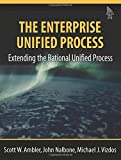Enterprise Unified Process (EUP) Site Map
From 2002-2005 I wrote extensively about the Enterprise Unified Process (EUP), an agile enterprise extension to the Rational Unified Process (RUP).
Site Contents
The EUP Phases:
The EUP Disciplines:
- The Operations and Support Discipline
- The Enterprise Business Modeling Discipline
- The Portfolio Management Discipline
- The Enterprise Architecture Discipline
- The Strategic Reuse Discipline
- ThePeople Management Discipline
- The Enterprise Administration Discipline
- The Software Process Improvement Discipline
Other Articles:
- Amalgamated Workflow Diagrams
- Enterprise Agile: Overview
- The EUP Core Practices
- Evidence that Agile Software Development Scales
- The History of the Unified Process
- The Zachman Framework and the RUP/EUP
Recommended Reading
 |
This book, Choose Your WoW! A Disciplined Agile Approach to Optimizing Your Way of Working (WoW) – Second Edition, is an indispensable guide for agile coaches and practitioners. It overviews key aspects of the Disciplined Agile® (DA™) tool kit. Hundreds of organizations around the world have already benefited from DA, which is the only comprehensive tool kit available for guidance on building high-performance agile teams and optimizing your WoW. As a hybrid of the leading agile, lean, and traditional approaches, DA provides hundreds of strategies to help you make better decisions within your agile teams, balancing self-organization with the realities and constraints of your unique enterprise context. This book represents leading-edge thinking about enterprise agile, some of which originated in the EUP and RUP. |
 |
This book, The Enterprise Unified Process: Extending the Rational Unified Process, defines the Enterprise Unified Process® (EUP), which was first introduced by myself in 1999 and later enhanced to support a wider variety of clients. The EUP is an extension to the IBM Rational Unified Process (RUP). The EUP extends the RUP to include the operation and support of a system after it is in production and its eventual retirement. Furthermore, because all but the smallest organizations have more than one system, the EUP also handles cross-system enterprise issues such as portfolio management, enterprise architecture, and strategic reuse. |
